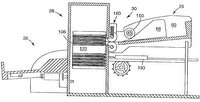
COURT MUST GIVE SOME CONSIDERATION TO CLAIM CONTRUCTION FOR PRELIMINARY INJUNCTION (Shuffle Master Inc. v. VendingData Corp (05-1208)) - Non Precedential:
VendingData appealed the grant of a preliminary injunction in favor of Shuffle Master. During the lower court proceedings, the both parties contested the term "forming at least one set of cards within the apparatus from the at least one deck of playing cards," that was found in the asserted claim.
Although the question of the proper construction of the claim was clearly in dispute, the court did not address the claim construction arguments made by VendingData and did not provide an explicit construction of the critical claim language in the patent. Instead, the court simply concluded that Shuffle Master was likely to succeed on the merits.
In reversing the lower court's decision, the Federal Circuit stated:
We have held that a district court does not have to conduct a comprehensive and final claim construction in a preliminary injunction proceeding. Sofamor Danek Group, Inc. v. DePuy-Motech, Inc., 74 F.3d 1216, 1221 (Fed. Cir. 1996). Similarly, it is not necessary for a court to conduct an explicit claim construction if the claim construction issue is a simple one that needs no analysis, or in which there is no reasonable ground for dispute as to claim meaning. Toro Co. v. Deere & Co., 355 F.3d 1313, 1322 (Fed. Cir. 2004). However, a district court in a preliminary injunction proceeding has the duty to determine whether the movant is likely to prevail on the merits, and if that question turns on a contested issue of claim construction, the court must give the claim construction issue the attention necessary to determine the likelihood of success. In this case, the dispute over the meaning of the “set of cards” limitation is central to determining whether Shuffle Master is likely to prevail on the merits of its infringement claim. The district court was therefore required to provide some form of claim construction, even if abbreviated, preliminary, or tentative.
Also, the court refused to provide its own claim construction, stating that the district court’s analysis is important to the process of claim construction, and that construing the claim without the guidance of the district court’s construction would be improper.
Judge Mayer dissented from the opinion, stating that there was no abuse of discretion by the lower court, since the claim construction proposed by VendingData could nevertheless be found to encompass VendingData's product.





Post a Comment